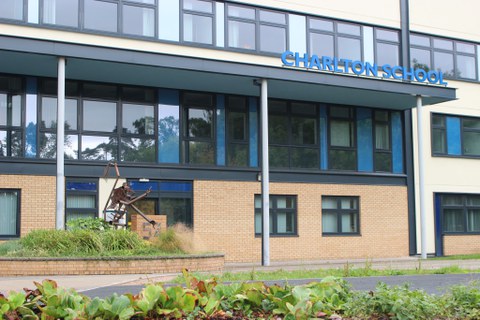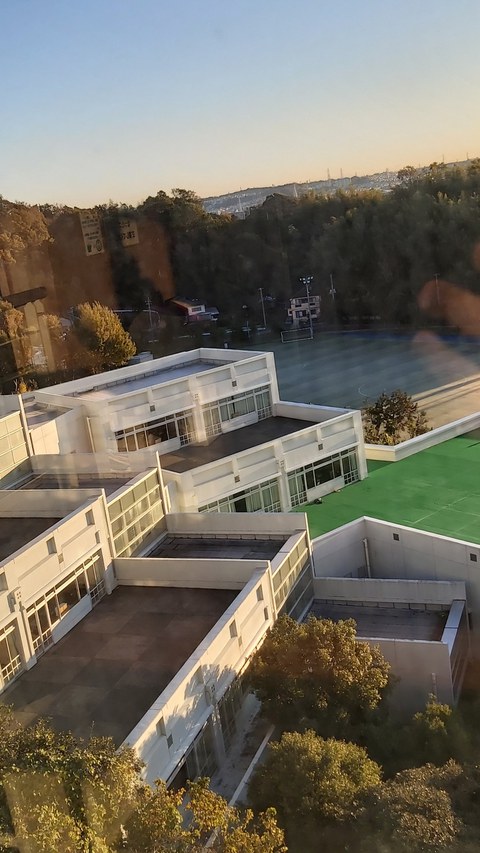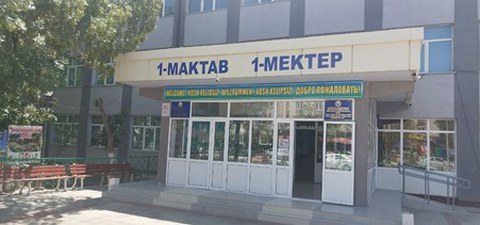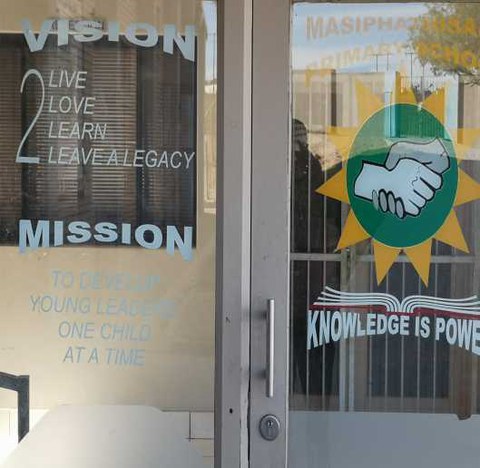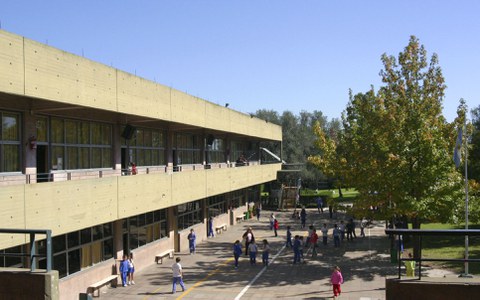International School Network
Are you ready for a new challenge and would you like to gain practical experience abroad? We support you in finding a suitable internship position at an educational establishment and in preparing your School internship abroad. The ZLSB cooperates with schools worldwide in order to provide students with valuable teaching and learning experiences during a school internship abroad. Currently, the international network mainly consists of schools of the various countries’ own education systems. An overview of the network is available on this map.
Table of contents
Europe
Schulform(en): Sekundarschule (klassen 1-12)
Profil: Die 97 Sekundarschule Bratya Miladinovi wurde 1980 gegründet. Dank des Engagements und der Anstrengungen der gesamten Schulgemeinschaft hat sich die Schule zu einer der erfolgreichsten und fortschrittlichsten Bildungseinrichtungen in der Gemeinde Lyulin entwickelt. Die Schüler:innen lernen Englisch, Deutsch, Französisch, Spanisch, Russisch und Koreanisch. Die Schule ist eine der wenigen in Sofia, die eine duale Ausbildung anbieten. Duales Lernen bedeutet, dass die Schüler:innen Lernen und Arbeiten miteinander verbinden, was sich in externen Evaluationen zeigt: Jedes Jahr verbessern sich die Leistungen. Die Schüler beteiligen sich aktiv an der Entwicklung der 97 Secondary School, indem sie im Schülerrat mitarbeiten.
Schülerzahl: ca. 1000 Schüler:innen
Praktikumsformate: Hospitationen, Unterrichtsvorbereitung, beaufsichtigtes Unterrichten, außerunterrichtlicher Aktivitäten
Außerunterrichtliche Aktivitäten: Kunstclub, Theaterclub, Wissenschaftsclub, Debattierclub, Schulrat, Sport, Kultur, Natur und Tourismus
Unterrichtssprachen: Bulgarisch
Für Praktika geöffnete Schulfächer: Englisch und Deutsch
Bevorzugte Praktikumszeiträume: Januar - März, Oktober - Dezember
Erwartungen an Praktikant:innen: Offenheit, Motivation, Engagement, Interesse für die bulgarische Kultur und das dortige Umfeld
Webseite: https://97su.bg/
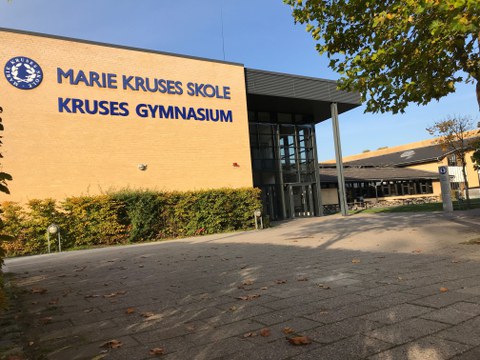
Marie Kruses School, Denmark
Type(s) of school: Elementary school, middle school (1st to 10th grade), grammar school (11th to 13th grade) → primary level and secondary levels I und II
Profile: Marie Kruses School was founded in 1869 as a private girls school in Copenhagen. In 1965, the school was opened to boys as well and, after several changes of location, moved to its current buildings in the Farum city district in 1971. Children attend elementary school from grades 1 to 10 and grammar school from grades 11 to 13, and are taught not only in Danish, but also in English, French and German. The motto of Marie Kruses School is “Ej at synes, men at være” (“Don’t think, but be”). Among other things, the school has an autonomous science building where interesting and challenging lessons are held. There is also a focus on developing and strengthening language subjects and practical music lessons.
Number of pupils: 400 (high school)
Internship formats: Lesson observation, lesson planning/preparation, teaching, extracurricular activities
Subjects taught: Danish, English, German, French, Spanish, history, social studies, religion, ancient history, philosophy, psychology, physical education, biology, chemistry, physics, mathematics, music, media, design, art
Preferred internship periods: Autumn (September to December), spring (no longer than until end of May). The school year runs from mid-August to the end of June.
Languages of instruction: Danish, English, German, French
Expectations interns should meet: Motivation, curiosity and self-reliance; wishes and requirements for the internship should be clearly communicated and agreed upon beforehand. Interns should be interested in teaching German, as the school would like to involve them in the subject. In the higher grades, however, teaching can also be done in English.
Other information: The school is willing to assist you in finding accommodation, but would ask you to look around the housing market yourself.
Website: https://mks.dk
Schulform: Sekundarschule (Secondary School Coeducational, Postprimary), Altersgruppen 11-16 Jahre (year 7 – 11)
Profil: Woodbrook College ist eine Postprimary School in Bray, Grafschaft Wicklow, Irland. Die Schule ist Teil des DEIS-Programms (Delivering Equality of Opportunity in Schools), einer Maßnahme des Bildungsministeriums zur Unterstützung von Schulen in benachteiligten Gemeinden. Auftrag: Erziehung in einer Atmosphäre, die Verantwortung, Toleranz und Respekt fördert. Vision: Gemeinsam lernen für eine bessere Zukunft.
Schülerzahl: 535
Praktikumsformate: Hospitation, Unterrichtsbeobachtung, Unterrichten, außerschulische Aktivitäten
Für Praktika geöffnete Schulfächer: Deutsch, Französisch, Sozialkunde/Politik (offen für andere)
Bevorzugte Praktikumszeiträume: Zu vereinbaren
Unterrichtssprache: Englisch
Erwartungen an Praktikant:innen: Gute Englischkenntnisse, polizeiliches Führungszeugnis, Fachwissen, Professionalität, Teamfähigkeit.
Außerunterrichtliche Aktivitäten: Arbeitsgemeinschaften (z.B. Deutschclub), Ausflüge falls gewünscht (teils mit Eigenbeteiligung)
Sonstige Hinweise: Eine Beratung ist möglich, aber leider könnte es schwierig sein, eine Unterkunft zu finden, da es im Land einen Wohnungsnotstand gibt.
Webseite: https://www.woodbrookcollege.ie/
Type(s) of school: Comprehensive school (year 7-11)
Profile: The Charlton School is located in Telford (situated between Birmingham and Shrewsbury). Approximately 1200 pupils aged between 11 and 16 years are educated in a school building in the Wellington district, which was completely rebuilt in 2016. The students learn German, French and, since 2022, also Spanish. The school is one of the very few schools in England where nearly all pupils study a foreign language and is characterised by a friendly, ambitious and helpful team of six foreign language teachers.
Number of pupils: 1200
Internship formats: Job shadowing, lesson planning/preparation, extra-curricular activities, teaching small groups, language assistance work
School subjects open for internships: Foreign languages (German (primary), French, Spanish)
Preferred internship periods: Between October and May
Languages of instruction: English
Expectations for trainees: trainees with a strong sense of initiative are needed to help students in teaching foreign languages - either in small groups or individually - to support the older students' preparations for their final exams, or to help ambitious students to improve their knowledge. Selected lectures can be prepared by the students individually. Furthermore, there is the possibility to gain experience in teaching. During free periods, organisational tasks (e.g. correcting) should be supported.
Extracurricular activities: Study groups (e.g. German Club), trips if requested (sometimes with individual costs).
Mentoring: Trainees are supervised by their assigned teachers and will be integrated into an open and helpful team.
Application instructions: Unfortunately, no financial support can be provided. Please contact the Erasmus office and/or other contact persons to find out about funding opportunities.
Other information: Accommodation may be requested from colleagues but cannot be guaranteed. A current police clearance certificate is also necessary upon arrival. In addition, a TIER 5 visa must be applied for (assistance through the Erasmus office)
Website: Home | Charlton School, charlton-school-assistant-ad-1.pdf (tu-dresden.de)
Type of school: Higher vocational school (five-year, grades 9 to 13) → secondary levels I and II
Profile: The vocational specialist school trains pupils in general subjects as well as in the vocational specializations of IT technology, programming, construction technology, finishing technology in the construction industry, surveying, landscaping, and photographic and multimedia technology. After passing the qualification examination, the graduates are awarded the title of technician. The school’s staff place great emphasis on teamwork and open interaction and exchange. The eTwinning school participates in various international projects. Many pupils complete internships in Italy, Spain, England, Germany and Portugal via the Erasmus+ program. The school also has its own swimming pool.
Number of pupils: Over 500
Internship formats: Lesson observation, planning and teaching your own lessons, individual workshops, opportunity for team teaching with experienced colleagues
Language of instruction: Polish, unless teaching foreign languages
Subjects in which internships are possible: In principle, all subjects taught at the school are open for internships.
Preferred internship periods: March to June, October to December
Expectations interns should meet: The school welcomes interns who enjoy working with young people and as part of a team, have a sense of humor, and are curious about new experiences.
Mentoring: Mentoring of future interns can also be done in English or German; the school management also speaks English.
Other information: The school will assist interested interns in finding local accommodation.
Type(s) of school: Elementary school, middle school, general school, grammar school → primary level, secondary levels I and II
Profile: The “Willy-Brandt-Schule” (WBS) is the only German school abroad in Poland that offers a school career in line with the German education system and has been awarded the title “Excellent German School Abroad”. It was founded in 1978 as the embassy school “Deutsche Schule Warschau”.
Education according to German standards as well as the promotion of German-Polish dialog and intercultural understanding are the essential foundations of the work in all parts of the school. The focus is on the university entrance qualification for studying at a German, Polish or international university after completing schooling at the WBS.
All subjects taught comply with the German “Abitur” (high school diploma) requirements with curricula modelled on those of Baden-Württemberg and Thuringia. In addition, the WBS attaches great importance to a high proportion of practical work in science lessons, development of artistic and artistic skills, development of sporting qualities, and scientific cooperation with the University of Warsaw. From a vocational point of view, the lessons are extended by internships in companies or, for example, events promoting careers. Special opportunities in teaching include the research weeks in the 12th grade, the surveying and vocational internship in the 10th grade, and the science picnic for the secondary level II as building blocks for the practical application of teaching content.
Number of pupils: Approx. 350
Extracurricular activities: Class trips, hiking days, pupil exchange with the “Archigymnasium” in Soest, various history projects, participation in the “School Bridge Weimar”, sports competitions such as the Warsaw Youth Olympics, school projects (for example, the St. Martin’s procession in November or the Nativity play). The afternoon supervision program provides pupils with a wide range of additional activities.
Internship formats: Lesson observation, lesson planning/preparation, teaching, extracurricular activities
Languages of instruction: Polish, German
Subjects in which internships are possible: German, English, mathematics, biology, chemistry and physics, art, history, ethics, geography (5th/6th grade in German, afterwards in English)
Preferred internship periods: All-year, elementary school: at least a ten-week internship, secondary level I/II: at least a six-week internship
Mentoring: Close supervision and support of interns by mentors; interns also have the freedom to try out pedagogical approaches or methods that are of interest to them.
Expectations interns should meet: Applicants with knowledge of German as a foreign language and students of teacher training courses for teaching at elementary schools are very welcome. Preference will be given to applicants who are studying two of the above-mentioned subjects and have already completed an internship at a school in Germany. Interns with German as a subject are expected to assist native Polish students in learning German in remedial classes.
Other information: The housing market in Warsaw is relaxed. There are sufficient options for accommodation. If necessary, the WBS will assist you with advice.
Website: https://www.wbs.pl
Type(s) of school: Kindergarten (3 to 6 year-olds), elementary school (grades 1 to 8) → primary level, secondary level I
Profile: Approximately 250 children learn at the school from kindergarten (from 3 years of age) to 8th grade. The pupils already learn English from elementary school and German from grade 7. The classes are small, with about 20 pupils in each class, and intensive individual support is possible. In their lessons, the teachers place special emphasis on group work, open discussions and learning in a playful atmosphere. Attention is also paid to the use of digital methods. The school creates a learning-friendly atmosphere and values the cooperation with interns in order to support pupils in expanding their language and social skills.
Number of pupils: Approx. 250
Extracurricular activities: Swimming lessons, sports activities, chess, theater, and career advice/orientation
Internship formats: Lesson observation, lesson preparation, teaching, extracurricular activities
Languages of instruction: Polish
Subjects in which internships are possible: Interns can participate in all subjects: Polish literature and language, mathematics, English, German, history, geography, sciences, computer science, art, music, physical education.
Preferred internship periods: April to May, September/October to November
Mentoring: The school provides mentoring to interns in English or German. Mentors support interns throughout the teaching process and provide advice on methods and materials.
Expectations interns should meet: Openness, motivation, commitment, treating pupils as individuals, creativity, self-reliance
Website: https://zsnr1wodzislaw.szkolnastrona.pl/
- Internships at other schools in Poland, especially in the Wroclaw region, can be arranged upon request.
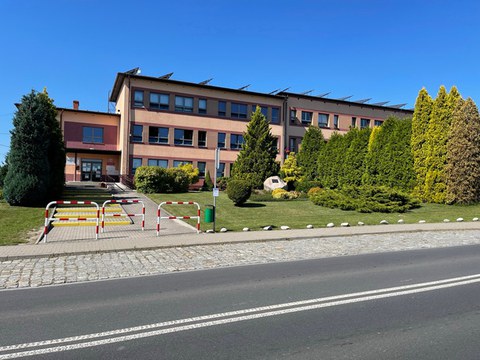
Grunschule Szkoła Podstawowa in Skrzyszów, Polen
Schulform: Grundschule (Klassenstufen 1–8) → Sekundarstufe I und II
Profil: Die Schule befindet sich auf dem Land im Süden Polens. Mit engagierten Lehrkräften, gut ausgestatteten Klassenräumen und interessanten außerschulischen Aktivitäten werden Schüler:innen ermutigt, ihr Potenzial zu entdecken. Die Betonung des Engagements in der Gemeinschaft, der Respekt vor der Tradition und eine unterstützende Atmosphäre schaffen die Voraussetzungen für eine positive Lernerfahrung. Die Schule nimmt an eTwinning-Projekten teil und sucht nach neuen Lösungen, um den Bildungsprozess attraktiver zu gestalten und kompetente, englischsprachige und umweltfreundliche Weltbürger:innen zu entwickeln. Die Schule arbeitet aktiv mit dem Lehrkräfteausbildungszentrum in Wodzisław zusammen.
Schülerzahl: etwa 320 Schüler:innen
Praktikumsformate: Unterrichtsbeobachtung, Unterrichtsvorbereitung und -durchführung, außerschulische Aktivitäten, Besuch von Nachbarschulen sind ebenfalls möglich
Unterrichtssprachen: Englisch und Deutsch (Ab Klasse 7)
Für Praktika geöffnete Schulfächer: Bevorzugt werden für das Praktikum folgende Unterrichtsfächer: Englisch, Deutsch, Naturwissenschaften, Mathematik und Kunst
Bevorzugte Praktikumszeiträume: Oktober - Dezember
Erwartungen an Praktikant:innen: Die Schule freut sich über Praktikant:innen, die gern mit Jugendlichen und im Team arbeiten, humorvoll und neugierig auf neue Erfahrungen sind.
Mentoring: Die Betreuung von zukünftigen Praktikantinnen und Praktikanten kann auch in Englisch oder Deutsch stattfinden und auch die Schulleitung spricht Englisch.
Sonstige Hinweise: Die Schule unterstützt interessierte Praktikant:innen dabei, Unterkünfte vor Ort zu finden.
Webseite: https://sp-skrzyszow.godow.pl/

Schulkomplex ZSP 21 in Breslau
Schulform: Grundschule (Klassenstufen 1–8) → Sekundarstufe I und II
Profil: "Alte Schule mit junger Seele". Die Schule beruft sich auf die besten Traditionen, indem sie die zeremoniellen und gewachsenen Traditionen pflegt und eigene neue schafft, die den Erwartungen der örtlichen Gemeinschaft entsprechen. Die Schule befindet sich an einem ruhigen und sicheren Ort, abseits des städtischen Trubels, inmitten ausgedehnter Grünflächen. Das Gebäude verfügt über eine gut ausgebaute Basis, u. a. 16 Unterrichtsräume, darunter ein Computerlabor und zwei Sporthallen. Die Klassenräume sind renoviert und mit Computern mit Internetzugang, Multimedia-Projektoren und interaktiven Whiteboards ausgestattet. Die Schulbibliothek verfügt über einen Lesesaal mit einem Multimedia-Center. Im Rahmen des Regierungsprogramms "Joyful School" wurde 2012 ein Spielplatz errichtet. Die Schule möchte Bedingungen schaffen, die der ganzheitlichen Entwicklung des Kindes in einer sicheren und freundlichen Atmosphäre förderlich sind. Alle Aktivitäten, auch die in Zusammenarbeit mit der Schulgemeinschaft und den Partnern, sind auf die Bedürfnisse der Schüler:innen ausgerichtet und ermöglichen ihnen, das Beste aus ihren Fähigkeiten zu machen.
Schülerzahl: etwa 300 Schüler:innen
Praktikumsformate: Die Schulen passen sich den Vorlieben der Studierenden an und sind bereit, den Unterricht, das Schulleben, die Schulfeste, etc. zu zeigen, eine Unterrichtsstunde zu unterrichten oder ein Projekt nach den Vorstellungen der Studierenden durchzuführen. Darüber hinaus lernen die Studierenden die DSW-Hochschule und das Lehrerausbildungszentrum kennen, die ihren Besuch koordinieren werden.
Unterrichtssprachen: Englisch und Deutsch
Für Praktika geöffnete Schulfächer: Englisch und Deutsch
Bevorzugte Praktikumszeiträume: März - Juni, Oktober - Dezember
Mentoring: Je nach den Fähigkeiten und Vorlieben des Studierenden gibt es die Möglichkeit, das Praktikum in mehr als einer Schule zu absolvieren. Es wird Unterstützung bei der Suche nach einer Unterkunft, bei der Organisation des Aufenthalts, bei der Integration mit den Studenten der DSW Wroclaw geboten.
Sonstige Hinweise: Kontaktperson: Dr. Anna Abramczyk (), bevorzugte Sprache: Deutsch
Webseite: https://www.sp9.wroclaw.pl/szkola/o-nas
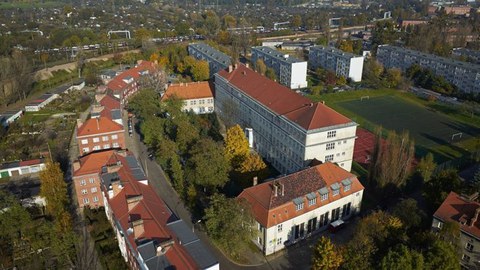
Schulgebäude der Zespół Szkół Nr 1 in Breslau
Schulform: Sekundarschule (ab Klasse 9)
Profil: Die Schule gilt in der Öffentlichkeit als sehr sicher, da sie sich offen für einen Zustand frei von körperlicher und seelischer Gewalt und von Süchten einsetzt. Zahlreiche wissenschaftliche Arbeitskreise und außerschulische Aktivitäten werden durchgeführt, um eine ganze Reihe von Interessen zu entwickeln. DIe Schule ist stolz auf die sehr gut ausgestatteten Klassenzimmer (8 Computerräume), eine Multimediabibliothek, einen Multimediaraum, Turnhallen, einen großen Sportplatz und ein Auditorium mit 250 Plätzen, das über ein funktionierendes Kino und eine Videothek verfügt, sowie ein Buffet und eine Kantine. Mit Weihnachtsfeiern, Kulturtagen, Kunstunterricht, Begegnungen mit interessanten Menschen, Kinovorführungen, Theateraufführungen, Wettbewerben, multimedialen Präsentationen versucht die Schule, die Eintönigkeit und das Grau des Lernalltags aufzulockern. Bei all diesen Aktivitäten wird die Schule vom Schulrat unterstützt, ohne den das Herz der Schule nicht so stark schlagen würde, wie es das tut.
Schülerzahl: etwa 500 Schüler:innen
Praktikumsformate: Die Schulen passen sich den Vorlieben der Studierenden an und sind bereit, den Unterricht, das Schulleben, die Schulfeste, etc. zu zeigen, eine Unterrichtsstunde zu unterrichten oder ein Projekt nach den Vorstellungen der Studierenden durchzuführen. Darüber hinaus lernen die Studierenden die DSW-Hochschule und das Lehrerausbildungszentrum kennen, die ihren Besuch koordinieren werden.
Unterrichtssprachen: Englisch und Deutsch
Für Praktika geöffnete Schulfächer: Englisch, Deutsch und Sport
Bevorzugte Praktikumszeiträume: März - Juni, Oktober - Dezember
Mentoring: Je nach den Fähigkeiten und Vorlieben des Studierenden gibt es die Möglichkeit, das Praktikum in mehr als einer Schule zu absolvieren. Es wird Unterstützung bei der Suche nach einer Unterkunft, bei der Organisation des Aufenthalts, bei der Integration mit den Studenten der DSW Wroclaw geboten.
Sonstige Hinweise: Kontaktperson: Dr. Anna Abramczyk (), bevorzugte Sprache: Deutsch
Webseite: https://www.zs1.wroc.pl/

Schulkomplex ZSP 21 in Breslau
Schulform: Grundschule (Klassenstufen 1–8) → Sekundarstufe I und II
Profil: Der Schul- und Kindergartenkomplex Nr. 21 ist ein moderner Schulkomplex, der am 01.09.2017 in Betrieb genommen wurde. Der Komplex ZSP 21 besteht aus: Kindergarten Nr. 32 und Grundschule Nr. 32 - benannt nach dem 100. Jahrestag der Unabhängigkeit Polens. DIe Schule verfügt über ein Lehrpersonal mit mehr als 100 Personen (darunter ein pädagogische, eine psychologische und eine logopädische Fachkraft). Das Motto "Quidquid discis tibi discis" ("Was immer du lernst, lernst du für dich selbst") gibt die Richtung der Entwicklung vor. Die Schule ist überzeugt, dass diese wenigen Worte die Bedeutung des Unterrichtens eines anderen Menschen auf den Punkt bringen. Alle Aktivitäten haben ein gemeinsames Ziel: das Kind/den Jugendlichen darauf vorzubereiten, das erworbene Wissen und die erworbenen Fähigkeiten in der Zukunft im Leben anzuwenden. Es geht also nicht in erster Linie um sehr gute Unterrichtsergebnisse, sondern um die persönliche Entwicklung eines jeden Kindes.
Schülerzahl: etwa 1000 Schüler:innen
Praktikumsformate: Die Schulen passen sich den Vorlieben der Studierenden an und sind bereit, den Unterricht, das Schulleben, die Schulfeste, etc. zu zeigen, eine Unterrichtsstunde zu unterrichten oder ein Projekt nach den Vorstellungen der Studierenden durchzuführen. Darüber hinaus lernen die Studierenden die DSW-Hochschule und das Lehrerausbildungszentrum kennen, die ihren Besuch koordinieren werden.
Unterrichtssprachen: Englisch und Deutsch
Für Praktika geöffnete Schulfächer: Englisch und Deutsch
Bevorzugte Praktikumszeiträume: März - Juni, Oktober - Dezember
Mentoring: Je nach den Fähigkeiten und Vorlieben des Studierenden gibt es die Möglichkeit, das Praktikum in mehr als einer Schule zu absolvieren. Es wird Unterstützung bei der Suche nach einer Unterkunft, bei der Organisation des Aufenthalts, bei der Integration mit den Studenten der DSW Wroclaw geboten.
Sonstige Hinweise: Kontaktperson: Dr. Anna Abramczyk (), bevorzugte Sprache: Deutsch
Webseite: https://zsp21wroclaw.pl/
Type(s) of school: Grammar school (grades 5 to 12) → secondary level I and II
Profile: the Janko Matúška State Grammar School offers various educational paths. It is possible to attend the grammar school for either four years (grades 9 to 12), for five years with bilingual orientation or for eight years (grades 5 to 12). The bilingual education pathway imparts Slovak and German. In total, three foreign languages are taught at the school: German, English and Italian. The most popular educational path is five years of grammar school. Accordingly, many pupils speak German. It is therefore possible to support all subjects taught bilingually during the internship. In addition to the traditional classrooms, there are several subject-specific classrooms, two sports halls and a swimming pool. The grammar school maintains school partnerships with grammar schools in Mikulov (CZ) and in Eisenstadt (A).
Number of pupils: Approx. 320
Extracurricular activities: Various courses and competitions, e.g. foreign languages, history, chemistry, mathematics, astronomy and sports (volleyball, floorball, swimming, fin swimming), soccer course, annual field trips, skiing course as well as school stays in England, Austria and Italy
Internship formats: Lesson observation, lesson planning/preparation, teaching, extracurricular activities
Languages of instruction: Slovak, German
Subjects in which internships are possible: Interns can be assigned to school subjects of the 5-year bilingual education path. In this, German is the second language of instruction. Accordingly, all standard subjects with German language support are open for internships (German, English, Italian, chemistry, physics, biology, mathematics, geography, social studies, history, Computer Science, Slovak, art and culture, sports, ethics, religion).
Preferred internship periods: September to June
Mentoring: Individual, by arrangement
Other information: During the internship, the halls of residence of the University of Trnava are available as accommodation.
Website: www.gymslga.sk
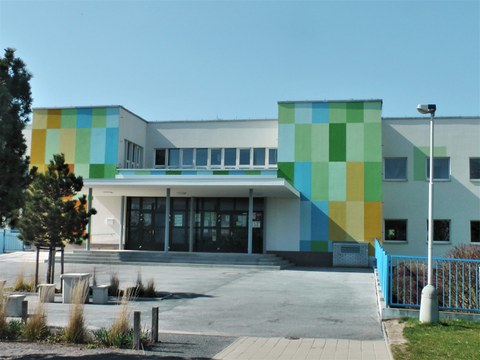
Základní Škola, Prague
Type(s) of school: Elementary school (grades 1 to 9) → primary level, secondary level I
Profile: Základní Škola is a state elementary school (grades 1 to 9) with a special foreign language profile. The three foreign languages taught are English, German and French. English is taught from the 1st grade, German and French are taught as 2nd foreign language from the 5th grade. The teaching staff maintains intensive collaborations with external partners and participates in school exchange programs (Comenius, Erasmus, Erasmus+ KA2).
Number of pupils: Approx. 550
Extracurricular activities: Special highlights at Základní Škola are the European Day of Languages, the Pancake Race and the Halloween Party. Every year, 4th grade students spend more than a week at the “English Country School”. Every two years, the students go on a language study trip to Great Britain, as well as occasional one-day trips to Germany, Austria, or Switzerland to practice German. The French teacher also prepares occasional trips to France. Working groups for sports, foreign languages, science, music, and art are on offer.
Internship formats: Lesson observation, lesson planning/preparation, teaching, extracurricular activities
Languages of instruction: Czech
Subjects in which internships are possible: English, French, German
Preferred internship periods: School year from September to June (ten months with Christmas, Easter and spring breaks)
Mentoring: Mentoring in the subjects English, German, French
Expectations interns should meet: Open-minded, active, good communication skills in English and French/German
Other information: Accommodation can be arranged through the university campus (approx. € 150 per month).
Website: https://www.zsmladi.cz/sekce/english-page-about-the-school
- Internships at other schools in Czechia, especially at grammar schools and middle schools for the subjects German, English, art and music in the Ústi nad Labem region, can be arranged upon request.
Schulform: alle Schulformen (Vorschule, Grundschule, Sekundarstufe)
Profil: Die Abteilung Education for the Environment and Sustainable Development (EESD) ist eine ständige horizontale Struktur des Ministeriums für Bildung, Kultur, Sport und Jugend der Republik Zypern. Sie wurde mit dem Ziel geschaffen, die Umsetzung und Aktualisierung der nationalen Strategieplanung für die Umweltbildung mit Schwerpunkt auf nachhaltiger Entwicklung zu überwachen und das staatliche Netzwerk von Bildungszentren für Umwelt und nachhaltige Entwicklung zu verwalten und zu beaufsichtigen, das aus sieben 7 Umweltbildungszentren besteht und eine ergänzende Struktur für die nicht-formale Bildung zu Fragen der nachhaltigen Entwicklung darstellt. In den Umweltbildungszentren werden spezialisierte Lehrkräfte beschäftigt, die jährlich Tausende von Schulkindern mit Bildungsprogrammen versorgen. Die Programme werden für alle Bildungsstufen (Vorschule, Grundschule, Sekundarstufe und Hochschule) durch aktives Lernen zur Umsetzung des Lehrplans für Bildung für nachhaltige Entwicklung (BNE) angeboten. Die Zentren bieten eintägige oder zwei-, drei- und fünftägige Programme zu Themen an, die mit der Gemeinde/dem Ökosystem zusammenhängen, wie z. B. biologische Vielfalt, Geologie, Boden, Wasser, Energie, nachhaltiger Tourismus, Kultur, lokale Gesellschaft, lokale Kulturpflanzen und andere. Das ganze Jahr über nehmen Schüler:innengruppen aller Bildungsstufen sowie Gruppen von Schüler:innen und Lehrkräften aktiv an den Programmen des Zentrums teil.
- Das Umweltbildungszentrum Akrotiri ist seit 2007 Teil des Netzwerks. Es ist das Ergebnis der Zusammenarbeit zwischen der Gemeinde Akrotiri, der Umweltabteilung des souveränen britischen Stützpunkts und dem Pädagogischen Institut Zyperns/der Abteilung für Bildung für Umwelt und nachhaltige Entwicklung (EESD). Seit 2014 ist das Zentrum in einem der umweltfreundlichsten Gebäude Zyperns untergebracht. Eine Vielzahl baulicher und funktionaler Elemente zielt darauf ab, die Kohlenstoffemissionen durch erneuerbare Energieerzeugung, Energieeinsparung und Recycling zu verringern. Das Gebäude verfügt über eine hocheffiziente Fotovoltaikanlage zur Stromerzeugung, ein Wasserrückgewinnungssystem, eine umfassende Wärmedämmung und andere innovative Systeme. Die speziell gestalteten Bereiche können für Bildungsprogramme genutzt werden, während gleichzeitig andere Besucher:innen empfangen werden. Es gibt Ausstellungsräume, ein Labor, einen Konferenz- und Videoraum, eine Bibliothek, einen Beobachtungsraum für Wildtiere, einen botanischen Garten und einen Spielplatz. Alle Bereiche sind für Rollstuhlfahrer:innen zugänglich. In den Ausstellungsräumen gibt es verschiedene Exponate und Ressourcen wie Dioramen, Quiz, Mikroskop, Touchscreen-Computer, Ausdrucke usw. Die Bibliothek verfügt über Bücher aller Niveaus zu verschiedenen Themen, die für Besucher:innen und Schüler:innen gleichermaßen zugänglich sind. Der Beobachtungsraum bietet einen spektakulären Blick auf den Salzsee und verfügt über hochwertige Teleskope und Ferngläser, mit denen man die Vielfalt der in der Region vorkommenden Vogelarten beobachten kann. Weitere Informationen: https://mepaa.moec.gov.cy/index.php/el/perivallontika/kpe-akrotiriiou/geniki-perigrafi-akrotiri
- Das Umweltbildungszentrum Pedoulas wurde 2005 vom Pädagogischen Institut Zyperns in Zusammenarbeit mit der Gemeinde Pedoulas gegründet. Das Umwelterziehungszentrum Pedoulas befindet sich in der ehemaligen Grundschule des Dorfes Pedoulas und umfasst einen Vortragssaal, ein Computerlabor und ein mit modernen Geräten ausgestattetes Ökologielabor. Außerdem verfügt es über zwei Herbergen mit einer Kapazität von 40 Personen für die Unterbringung der Teilnehmer an den zweitägigen (eine Nacht) und dreitägigen (zwei Nächte) Umweltbildungsprogrammen. Das Umweltbildungszentrum Pedoulas ist von einem Innenhof umgeben, der als Bildungsraum im Freien sowie als Erholungs- und Unterhaltungsraum für die Besucher genutzt wird. Es gibt auch Einrichtungen für Basketball, Volleyball und Fußball. Weitere Informationen: https://mepaa.moec.gov.cy/index.php/el/perivallontika/kpe-pedoula/geniki-perigrafi-pedoulas
- Das Umwelterziehungszentrum von Salamiou wurde 2010 gegründet und ist in der ehemaligen Grundschule des Dorfes untergebracht, die in den 1990er Jahren wegen sinkender Schülerzahlen ihren Betrieb einstellte. Die Einrichtung des Zentrums ist ein wichtiges Projekt für die Wiederbelebung des Dorfes und die Wiederbelebung der Gemeinde auf der Grundlage der Prinzipien der nachhaltigen Entwicklung. Das Gebäude aus dem Jahr 1930 wurde im Rahmen des Gesetzes zum Schutz des kulturellen Erbes der Region zu einem geschützten Bauwerk erklärt. Es wurde mit Mitteln aus dem norwegischen Finanzierungsmechanismus 2004-2009 restauriert. Der Betrieb des Zentrums basiert auf der Hervorhebung der lokalen Besonderheiten der Region Salamiou und der aktiven Einbeziehung der lokalen Bevölkerung sowie der Nutzung aller Gemeinschaftsbereiche als grundlegende pädagogische Instrumente. Das Umweltbildungszentrum Salamiou verfügt über einen Vortragssaal, ein Ökologielabor, einen Raum für kreative Aktivitäten und eine Bibliothek. Es bietet eintägige Umweltbildungsprogramme zu Themen an, die mit den Umweltmerkmalen der Gemeinde zusammenhängen. Weitere Informationen: https://mepaa.moec.gov.cy/index.php/el/perivallontika/kpe-salamious/geniki-perigrafi-salamious
- Das Umweltbildungszentrum Athalassa befindet sich am nordöstlichen Rand des Athalassa-Nationalparks in Nikosia. Es nahm seinen Betrieb im Jahr 2004 als Umweltinformationszentrum unter der Aufsicht der Forstbehörde auf. Seit 2008 hat es sich in Zusammenarbeit mit dem Pädagogischen Institut zu einem Umweltinformations- und -bildungszentrum entwickelt und ist dem Netzwerk der Umweltbildungszentren des Ministeriums für Bildung, Sport und Jugend beigetreten. Die Gebäude, in denen das Zentrum untergebracht ist, sind alte Regierungsgebäude, die von der Forstbehörde renoviert wurden. Es heißt Schüler:innen aller Bildungsstufen sowie Studierende von Universitäten in Zypern und im Ausland willkommen, die die Möglichkeit haben, die Ausstellungsstücke des Museums in den Räumlichkeiten des Umweltbildungszentrums zu erkunden und an einem Bildungsprogramm ihrer Wahl teilzunehmen. Das Umwelterziehungszentrum von Athalassa umfasst ein Labor, vier Diorama-Räume, einen Projektionsraum, einen Raum für Flora und Fauna, einen botanischen Garten mit repräsentativen Pflanzen und Felsen sowie einen Themenpark mit heimischen und traditionellen Tieren. Weitere Informationen: https://mepaa.moec.gov.cy/index.php/el/perivallontika/kpe-athalassas/geniki-perigrafi-athalassas
- Das Umweltbildungs- und -informationszentrum Cape Greco wurde 2016 in Zusammenarbeit zwischen dem Pädagogischen Institut und der Forstbehörde in Betrieb genommen. Das Umweltbildungs- und -informationszentrum Cape Greco liegt an der südöstlichen Spitze Zyperns, im Herzen des Cape Greco National Forest Park, der ein Schutzgebiet des europäischen Natura 2000-Netzwerks ist. Das Zentrum wurde im Rahmen des Programms zur Entwicklung des ländlichen Raums 2007-2013 eingerichtet und von der Europäischen Union und der Republik Zypern kofinanziert. Die Einrichtung des Umweltbildungs- und -informationszentrums Cape Greco ist ein wichtiges Projekt, das zur Aufwertung des Cape Greco National Forest Park auf der Grundlage der Prinzipien der nachhaltigen Entwicklung beitragen soll. Das Cape Greco Environmental Education and Information Center ist in einem neu errichteten Gebäude untergebracht, das sich harmonisch in die natürliche Umgebung des Gebiets einfügt. Es handelt sich um ein umweltfreundliches Gebäude, das auf ein angemessenes bioklimatisches Verhalten und die Minimierung negativer Auswirkungen (Bau, Energie und Ästhetik) auf die Umwelt abzielt. Das Gebäude stellt eine natürliche Erweiterung der Landschaft von Cape Greco dar und verwendet umweltfreundliche Materialien aus der Region. Das Zentrum verfügt über ein Amphitheater für Präsentationen und Vorträge, ein Klassenraum-Computerlabor, eine Ausstellungshalle, Aquarien, einen Empfangsbereich und eine Cafeteria. Die Ausstellungshalle umfasst Dioramen, die die Flora und Fauna der Region zeigen, Muschelsammlungen, Fossilien, Gesteine, interaktive Lernspiele, Touchscreen-Computer und vieles mehr. Im Außenbereich ist die Anlage eines Gartens geplant, in dem verschiedene repräsentative Arten der zypriotischen Flora zu sehen sind und der als Bildungsraum im Freien und zur Unterhaltung der Besucher dient. Weitere Informationen: https://mepaa.moec.gov.cy/index.php/el/perivallontika/kpe-kavo-greko/geniki-perigrafi-kavo-greko
-
Das Umweltbildungszentrum Koilani liegt in der halbgebirgigen Region Limassol in der Gemeinde Koilani, 38,8 km von der Stadt Limassol entfernt. Es wurde 2019 vom Pädagogischen Institut Zyperns in Zusammenarbeit mit der Gemeinde Koilani gegründet und ist Mitglied des staatlichen Netzwerks von Umweltbildungszentren des Ministeriums für Bildung, Sport und Jugend Zyperns. Seine Gründung ist ein bedeutendes Projekt zur Wiederbelebung und Verjüngung der Gemeinschaft auf der Grundlage der Grundsätze einer nachhaltigen Entwicklung. Das Koilani Environmental Education Center ist in der ehemaligen Grundschule der Gemeinde untergebracht, die so renoviert wurde, dass sie mit der natürlichen Umgebung der Gegend harmoniert. Die für ihren Weinanbau und die Produktion von Weinbauprodukten bekannte Gemeinde gilt als berühmtes Weindorf. Das Koilani Environmental Education Center umfasst einen Vortrags-/Präsentationssaal, ein Computerlabor und einen Raum für künstlerische/kreative Aktivitäten. Sein Außenbereich ist von einem Weinberg, einem botanischen Garten und einem Obstgarten mit repräsentativen Pflanzen und Bäumen der Region, einer felsigen Landschaft und einem kleinen Waldgebiet umgeben. Weitere Informationen: https://mepaa.moec.gov.cy/index.php/el/perivallontika/kpe-koilani/geniki-perigrafi-koilani
-
Das Panagia Environmental Education Center wurde 2019 vom Pädagogischen Institut in Zusammenarbeit mit der Gemeinde Panagia gegründet. Es ist das neueste der sieben Umweltzentren im staatlichen Netzwerk der Umweltbildungszentren des Ministeriums für Bildung, Sport und Jugend. Es liegt in der Bergregion von Paphos im Dorf Panagia, 36 Kilometer nordöstlich der Stadt Paphos. Das Zentrum ist in der ehemaligen Turnhalle „Ethnarch Makarios III“ der Gemeinde untergebracht, die renoviert wurde, um als attraktiver Lernraum zu dienen und den natürlichen Reichtum der Region zu präsentieren. Der Hauptzweck des Zentrums besteht darin, Studenten an Outdoor- und Erlebnisaktivitäten in verschiedenen Studienbereichen der Region zu beteiligen und dabei lokale Nutzpflanzen, Wälder, Berge, Feuchtgebiete, Naturpfade und Dämme zu nutzen. Das Umweltbildungszentrum Panagia umfasst einen Vortrags-/Präsentationsraum, eine Bibliothek, einen Computerraum, einen Raum für künstlerische/kreative Aktivitäten, Übernachtungszimmer, eine Kletterwand im Freien und verschiedene Outdoor- und Indoor-Spiele, eine kostenlose Suchecke und einen Kräutergarten /Gemüsegarten und eine Walddarstellung im Freien. Weitere Informationen: https://mepaa.moec.gov.cy/index.php/el/perivallontika/kpe-panagia/geniki-perigrafi-panagia
Praktikumsformate: Unterrichtsbeobachtung, Co-Teaching, Unterrichtsvorbereitung und -durchführung, Lehrplanentwicklung, Evaluierung des Bildungsprogramms, außerschulische Aktivitäten,
Unterrichtssprachen: Englisch und Deutsch (Ab Klasse 7)
Für Praktika geöffnete Schulfächer: Bevorzugt werden für das Praktikum folgende Unterrichtsfächer: Englisch, Deutsch, Naturwissenschaften, Mathematik und Kunst
Bevorzugte Praktikumszeiträume: September - Juli, Die Paktikumdauer in den Umweltbildungszentren beträgt meist eine Woche und kann je nach akademischem Kalender und den Anforderungen des Lehramtsstudiums angepasst werden.
Erwartungen an Praktikant:innen: Praktikant:innen sollten anpassungsfähig und offen für eine Vielzahl von Aufgaben und Verantwortlichkeiten sein. Außerdem wird erwartet, dass sie mit Studierenden, Pädagog:innen und anderen Interessengruppen interagieren dabei eine klare Kommunikation auf Englisch leisten können.
Mentoring: Einige Umweltzentren bieten möglicherweise Unterstützung oder Anleitung bei der Suche nach einer geeigneten Unterkunft für Praktikant:innen, während andere es den ihnen überlassen, sich selbst um eine Unterkunft zu kümmern.
Sonstige Hinweise:
Kontakt
Dr. Aravella Zachariou, Head of the Unit for EESD
Tel.: +357 22 402352
Asia
Project at Sau Ming Primary School, Hong Kong
Type(s) of school: Elementary school (grades 1 to 6) → Primary level, secondary level I
Profile: The main goals of Sau Ming Primary School are to promote healthy lifestyles, innovative learning assessments and to encourage creativity. The elementary school supports bilingualism and trilingualism. Native speakers are employed in teaching English. The Primary Literacy Programme – Reading and Writing is used in grades 1 to 3, and a task-based learning program is used in grades 1 to 6. The school’s special profile includes drama classes (in Chinese and English), a training program for logical thinking and exploratory learning, the promotion of interest in symbolic logic, science and technology, and of gifted students. In addition, learning programs abroad are organized to broaden students’ horizons and learning experiences. The school has received the Hong Kong Green School Award for its commitment to the environment.
Number of pupils: Approx. 1,000
Internship formats: Lesson observation, extracurricular activities
Languages of instruction: Cantonese, English
Subjects in which internships are possible: All
Preferred internship periods: Please inquire at time of application
Website: http://www.saumingps.edu.hk/home/index.php, https://www.hkschooldata.com/index.php/school/sau-ming-primary-school
Project at Sau Ming Primary School, Hong Kong
Type(s) of school: Elementary school (grades 1 to 6) → Primary level, secondary level I
Profile: The main goals of Sau Ming Primary School are to promote healthy lifestyles, innovative learning assessments and to encourage creativity. The elementary school supports bilingualism and trilingualism. Native speakers are employed in teaching English. The Primary Literacy Programme – Reading and Writing is used in grades 1 to 3, and a task-based learning program is used in grades 1 to 6. The school’s special profile includes drama classes (in Chinese and English), a training program for logical thinking and exploratory learning, the promotion of interest in symbolic logic, science and technology, and of gifted students. In addition, learning programs abroad are organized to broaden students’ horizons and learning experiences. The school has received the Hong Kong Green School Award for its commitment to the environment.
Number of pupils: Approx. 1,000
Internship formats: Lesson observation, extracurricular activities
Languages of instruction: Cantonese, English
Subjects in which internships are possible: All
Preferred internship periods: Please inquire at time of application
Website: http://www.saumingps.edu.hk/home/index.php, https://www.hkschooldata.com/index.php/school/sau-ming-primary-school
Project at Sau Ming Primary School, Hong Kong
Type(s) of school: Elementary school (grades 1 to 6) → Primary level, secondary level I
Profile: The main goals of Sau Ming Primary School are to promote healthy lifestyles, innovative learning assessments and to encourage creativity. The elementary school supports bilingualism and trilingualism. Native speakers are employed in teaching English. The Primary Literacy Programme – Reading and Writing is used in grades 1 to 3, and a task-based learning program is used in grades 1 to 6. The school’s special profile includes drama classes (in Chinese and English), a training program for logical thinking and exploratory learning, the promotion of interest in symbolic logic, science and technology, and of gifted students. In addition, learning programs abroad are organized to broaden students’ horizons and learning experiences. The school has received the Hong Kong Green School Award for its commitment to the environment.
Number of pupils: Approx. 1,000
Internship formats: Lesson observation, extracurricular activities
Languages of instruction: Cantonese, English
Subjects in which internships are possible: All
Preferred internship periods: Please inquire at time of application
Website: http://www.saumingps.edu.hk/home/index.php, https://www.hkschooldata.com/index.php/school/sau-ming-primary-school
Einblicke in die Arbeit einer Sekolah Adat in Indonesien © Stephanus Mulyadi
Types of school: Spanning all types
Profile: Sekolah Adat are non-formal indigenous schools where children spend afternoons or weekends (Friday to Sunday) learning and experiencing indigenous traditions, living with and in nature, traditional music, dances and games, as well as handicraft techniques. In the last three years, Merangat Foundation has established three Sekolah Adat in West Kalimantan: Sekolah Adat Tua’ Sangau (SAKTA), Sekola Adat Togung Tebirung (SATT) and Sekolah Adat Jut Ubing (SAJU). These are non-formal schools supported by the village community and the foundation. There are no school fees and the teachers work on a voluntary basis. The focus is on respect for nature, on community and imparting traditions.
Internship formats: Interns are welcome for both observing lessons and teaching activities. As the activities of Sekolah Adat only take place from Friday to Sunday, interns can devote Monday to Thursday to, for example, preparing lessons, learning about local art, culture, tradition and the village community, exploring the rainforest of Kalimantan, experiencing Dayak culture, living in a longhouse, etc.
Languages of instruction: English, Bahasa, Bahasa Kantu’
Areas of learning in which internships are possible: Environmental education, documentary film, English
Preferred internship periods: From April onwards
Mentoring: In English
Other information: Students can stay with the hospitable families of the village community during their internship. There are no hotels in the region.
Website: https://www.facebook.com/Sekolah-Adat-Kantu-Tua-Sangau-104338267574884/
© ZLSB
Types of school: Preschool, elementary school, high school, grammar school → primary level, secondary levels I and II
Profile: The Tabeetha School in Tel Aviv’s Jaffa city district is an educational and spiritual place for pupils of different faiths and nationalities. It is an international, English-language school under the trusteeship of the Church of Scotland. The curriculum is based on the English education system and leads to IGCSE, GCSE and A-level degrees, which are accepted by universities in Israel and around the world. More than 40 nationalities are represented at the school. Following Christian values, it promotes tolerance and understanding and ensures that children grow up, learn and work together in a positive, stimulating and supportive climate. Pupils are educated from preschool through elementary school to grammar school.
Number of pupils: Approx. 330
Internship formats: Lesson observation, lesson planning/preparation, teaching, extracurricular activities, designing projects with the pupils
Languages of instruction: English
Subjects in which internships are possible: Arabic, art, biology, chemistry, English, English literature, geography, Hebrew, history, mathematics, middle eastern studies, Music, philosophy & religion, PSHE, Russian, physical education.
Preferred internship periods: Secondary level: August to December and February to April; primary level: year-round; school closures: Early November (1 week), Christmas (2 weeks), Easter (2 weeks)
Mentoring: Available in English
Expectations interns should meet: To have a good understanding of the needs and requirements of the school and of TUD, to make contact with the subject or class teachers, high motivation, flexibility
Other information: Accommodation should be arranged prior to arrival. Little assistance can be given in finding accommodation.
Website: https://tabeethaschool.org
Presentation of International Leaders Academy, Amman © Leaders Academy
Type(s) of school: Elementary school, middle school, grammar school → primary level, secondary levels I and II
Profile: The International Leaders Academy (ILA) is located in Jordan in an area close to nature on the outskirts of the capital Amman. Approximately 2,000 children from kindergarten age (3 to 6) to grammar school are supervised here. Teaching is in English but Arabic is also spoken in the kindergarten. The Leaders Academy allows the children individual learning and discovering. It is accredited by the Jordanian Ministry of Education and authorized by the British Council for the Cambridge International Examination. It also offers the following international exams: ACT, SAT, IGCSE, AS, A-Level and National Exams (Tawjihi). The school’s vision is: “We inspire, challenge and empower leaders of tomorrow.”
Number of pupils: Approx. 2,000
Extracurricular activities: Student council, debating society, community service, track-and-field athletics, model United Nations, international projects
Internship formats: Lesson observation, lesson planning/preparation, teaching, extracurricular activities
Languages of instruction: English
Subjects in which internships are possible: English, Arabic, maths, science, biology, chemistry, physics, language history, and art
Preferred internship periods: Starting from February is preferred; the school year runs from September to June with a break in January
Mentoring: Professional and pedagogical mentors supervise interns
Expectations interns should meet: Interest in practical experience, high level of communication and cooperation skills
Other information: The school will assist in finding accommodation
Website: http://www.leadersacademy.edu.jo/ar
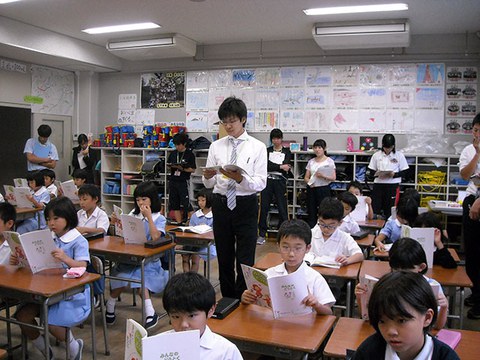
A day at Tokyo Gakugei University Oizumi Elementary School
Type(s) of school: elementary school (grades 1 to 6) → primary level, secondary level I
Profile: Tokyo Gakugei University Oizumi Elementary School is a Japanese public school with four missions: Public education, pedagogical practice and research, teacher training, and promoting educational research in the region. The pedagogical goals are to promote motivated learning, independent thinking, steadfastness, mutual support and consideration, and a strong and pure heart in children. Important values are tolerance and the ability to grow individually within the community. This is the first elementary school to offer classes for people returning from abroad. Research has been conducted on education for repatriates and international understanding. The school places great emphasis on learning from experience. In addition, cross-grade work is done inn what is called “seikatsu-dan”.
Number of pupils: Approx. 580
Internship formats: Lesson observation, supporting lessons, extracurricular activities: Supervising lunch break, organizing school events, etc.
Language of instruction: Japanese
Preferred internship periods: January to mid-March, April to July
Expectations interns should meet: Knowledge of Japanese (N4/N3) is recommended
Website: www.es.oizumi.u-gakugei.ac.jp
Type(s) of school: High school, grammar school → secondary levels I and II
Profile: Kumon Kokusai Junior/Senior High School (KKG) is a private school with an attached boarding school, which is distinguished by the fact that – unlike state schools – it does not have a fixed school uniform or written school rules. Although the six-year curriculum is taught in Japanese, the school places great emphasis on international understanding and has a high percentage of repatriates and pupils with foreign citizenship within its student body of nearly 1,000 boys and girls. Since 2014, KGG has participated in the Japanese Ministry of Education’s Super Global High School program, which aims to promote internationally mobile pupils. Furthermore, the school offers a multi-level English program and native speakers as English teachers, as well as various after-school support programs (science, Japanese, English, etc. with supervision by a teacher). The support programs are based on the Kumon teaching method, which is specially adapted to the heterogeneous student body.
Number of pupils: Approx. 1,000
Extracurricular activities: Sports clubs; art clubs, music working groups and other educational activities; International Days, Japanese Culture Field Trip, English Study Trips, Adventure Camp, participation in the “Model United Nations Programme”
Internship formats: Lesson observation, lesson planning/preparation, teaching
Teaching Languages: Japanese; English (in English classes)
Subjects in which internships are possible: English; Japanese; geography; mathematics; music; science; art; home economics, physical education; ethics; computer science
Preferred internship periods: Early April to late May; early July to August; October to late November; January and February (with restrictions)
Mentoring: Depending on the subject combination, interns are supported by a contact person. Some teaching staff are fluent in English and can translate some of what is happening in the lessons to the interns.
Expectations interns should meet: Very good knowledge of English; knowledge of Japanese helpful; interest in new teaching and learning methods
Other information: Accommodation in the school's own hall of residence possible by arrangement
Website: http://www.kumon.ac.jp/k-gakuen/kokusai-e/index.php
Schulform(en): allgemeinbildende Schule (Klassenstufen: 1-11)
Profil: Die Schule №1 ist eine der größten Schulen in Nukus, der Hauptstadt der usbekischen autonomen Republik Karakapalstan. Sie befindet sich im Zentrum der Stadt, unweit des Kunstmuseum Nukus (‘Savitsky Museum of Art‘ - bekannt als ‘Louvre der Wüste‘, u.a. weltweit zweitgrößte Sammlung russischer Avantgarde). In der Schule lernen mehr als 2000 Schülerinnen und Schüler unterschiedlicher Nationalitäten, von der ersten bis zur 11. Klasse. Der reguläre Unterricht findet auf Russisch und Karakalpakisch statt. Als Fremdsprachenunterricht wird Deutsch angeboten. Seit 2002 gehört die Schule zum weltweiten Netzwerk der Initiative „Schulen: Partner der Zukunft“ (PASCH). Die Kooperation mit dem Goethe-Institut ermöglicht allen Schülerinnen und Schülern der Schule eine kostenlose Deutschprüfung am Goethe-Institut abzulegen und an einem Sprachkurs in Deutschland teilzunehmen. Außerdem werden fächerübergreifende Projekten in den Fächern Mathematik und Deutsch sowie Biologie und Deutsch vorbereitet und durchgeführt und außerunterrichtliche MINT-Zirkel (für Mathematik und Deutsch) angeboten.
Die Schule verfolgt eine Internationalisierungsstrategie und pflegt Kontakte mit internationalen Organisationen, wie UNICEF, ACCELS (USA) oder SES (Senior Experten Service, Deutschland). Im Rahmen der Kooperation mit dem SES wurden mehrere Aufenthalten von deutschen Senioren an der Schule absolviert.
Schülerzahl: ca. 2060 Schüler:innen
Außerunterrichtliche Aktivitäten:
Sprachzirkel (Deutsch, Russisch, Englisch), MINT-Zirkel (Mathematik und Deutsch), Musikzirkel, Club „Zakovat“, Sport.
Praktikumsformate: Hospitation, Unterrichten, außerunterrichtliche Tätigkeiten
Unterrichtssprachen: Russisch, Karakalpakisch, Deutsch
Für Praxis geöffnete Schulfächer: Deutsch, Russisch, MINT-Fächer
Bevorzugter Praktikumszeitraum: September-November; März-Mai
Mentoring: Fachliche und pädagogische Mentor/innen an der Schule sowie von der Pädagogischen Hochschule Nukus betreuen die Praktikant/innen.
Erwartungen an Praktikant/innen: Interesse an Praxiserfahrung, hohes Maß an Kommunikation- und Kooperationsfähigkeit, Zuverlässigkeit
Sonstige Hinweise: Die Schule unterstützt bei der Suche nach einer Unterkunft. Zur Wahl stehen die Unterkunft in einer Gastfamilie oder im Wohnheim der Pädagogischen Hochschule Nukus (https://ndpi.uz).
Webseite: http://nukschool1.zn.uz
Impressions of the project ‘Sustainable Challenge’ at Olympia Schools Hanoi, Vietnam (2017) © Olympia Schools
Types of school: Elementary school, high school, grammar school → primary level, secondary levels I and II
Profile: Olympia School in Hanoi is an innovative school whose vision is a sustainable future for everyone. That is why it promotes creativity, healthy and happy living, and lifelong learning for its students in a stimulating learning environment. The school’s seven core values include pride, respect, empathy, perseverance, reliability, responsibility, and excellence. The pupil-teacher ratio is 1 in 6. 70 % of its pupils participate in summer schools in the EU, USA, Australia or Singapore during their school career. The school follows the Vietnamese curriculum, but also offers international dual degrees. It offers various educational programs, including a core subjects program, LiFE (Learning in Fostering Environment), ESL/Humanities and ICT. It also participates in a program for prospective teachers. Olympia Schools use blended-learning methods, interdisciplinary projects, and interactive classrooms.
Extracurricular activities: 20 to 25 clubs per school type, cultural projects and events, service learning, project-based learning programs
Internship formats: Interns can gain classroom observation experience in maths, English, the sciences, and some humanities. In addition, there are also opportunities to assist or even lead teaching complexes.
Languages of instruction: English, Vietnamese
School subjects in which internships are possible: Mathematics, English, sciences (physics, chemistry, biology), some humanities subjects
Preferred internship periods: At least 9 weeks, starting in October or February
Mentoring: By experienced subject supervisors
Expectations interns should meet: Good health, an open heart, flexibility, and sensitivity
Other information: Assistance provided for finding accommodation. Free meals and uniform at the school.
Website: http://en.theolympiaschools.edu.vn/
Africa
Schulform: Grundschule (sechsjährig, Klassenstufen 1– 6)
Profil: Die Schule ist auf Inklusion (integrative Bildung) ausgerichtet und erhält besondere Unterstützung vom Ministerium für Bildung und menschliche Entwicklung Mosambiks und von der Pädagogischen Universität in Maputo. Die Schule ist in der Lage, Kinder zu erkennen und zu fördern, die einen leichten oder mittleren Förderbedarf haben.
Schülerzahl: etwa 2500 Schüler:innen
Praktikumsformate: Beobachtung von Unterrichtsstunden, Teilnahme an der Unterrichtsplanung/-vorbereitung und methodischer Austausch mit den Lehrkräften der Schule, Initiierung und Teilnahme an außerschulischen Aktivitäten
Unterrichtssprachen: Portugiesisch
Für Praktika geöffnete Schulfächer: Mathematik- und Naturwissenschaftsunterricht, Erstellung von Lehr- und Lernmaterial
Bevorzugte Praktikumszeiträume: Februar - Oktober
Erwartungen an Praktikant:innen: Praktikant:innen sollen bei der inklusiven Bildung beisteuern, indem sie ihre Fähigkeiten zur Diagnose und Unterstützung von Kindern mit sonderpädagogischem Förderbedarf einsetzen. Die Schule ist außerdem Austausch an einem Austausch von Erfahrungen in der Pädagogik und Didaktik interessiert.
Sonstige Hinweise: Die Schule unterstützt interessierte Praktikant:innen dabei, Unterkünfte vor Ort zu finden.
School types: Elementary school → primary level, secondary level I
Profile: Masiphathisane Primary School was established in 2010 through a collaboration between PetroSA and the South African Ministry of Education. The school was originally built for 500 pupils, but due to migration patterns, the number of enrolled pupils increased to the current 1,600. Although the language of instruction at the school is English, you as an intern will hear many other languages, as Isixhosa is the mother tongue for 83% of the pupils and Afrikaans for the other 17 %. The goal is to provide a stimulating and supportive learning environment for the children, many of whom are growing up in poverty. The school’s motto is derived from a quote by Nelson Mandela: “Education is the most powerful weapon with which to change the world.”
Number of pupils: Approximately 1,600
Internship formats: Lesson observation, lesson preparation, teaching
School subjects open for internships: English, mathematics, geography, history
Language of instruction: English
Extracurricular activities: Track-and-field athletics, cricket, soccer, chess, choir, theater, dance, and a special maths program
Expectations interns should meet: Good English skills
North and South America
School types: Elementary school, (technical) secondary school, grammar school → primary level, secondary levels I and II
Profile: One of the main goals of Hölters School in Buenos Aires is to promote openness towards other cultures. The GLD school provides German classes in each year with at least six hours per week, so that the German Language Diplomas I and II can be taken. In years 4 to 6, pupils choose a profile: Social sciences, natural sciences, economics or electrical engineering. There is also the opportunity to train as a mechatronics technician. Through various annual activities, pupils are encouraged to develop a greater awareness of nature and the environment. In this context, they carry out activities at various destinations, which, among other things, promote teamwork and knowledge of natural and cultural resources.
Number of pupils: Approx. 1,400
School subjects in which internships are possible: Computer science, physical education, art
Languages of instruction: German, Spanish, English
Extracurricular activities: Theater, gardening, living in nature, choir, handicraft workshop, laboratory experiments, handball, track-and-field athletics, gymnastics, women’s field hockey, sculpture, chess, dance, literature workshop, recycling
Website: http://www.hoelters.edu.ar/
CLC Charter School State College, Pennsylvania © Raisa Gray/CLC Charter School State College, Pennsylvania
Type of school: Secondary school (grades 5 to 8) → secondary level I
Profile: CLC Charter is a rather small middle school with about 100 pupils. The school emphasizes hands-on and project-based learning. The teachers design projects that are true to life and are solved or processed by the pupils in a problem-based manner. The projects usually draw on several subjects and curricula, including sciences, mathematics, social studies, etc.
Number of pupils: Approx. 100
Extracurricular activities: Over 20 clubs with different orientations
Internship formats: Lesson observation, lesson planning/preparation, teaching
Language of instruction: English
Subjects open for internships: The interdisciplinary projects cover a variety of subjects at the same time. These include English-based work in addition to the sciences and mathematics.
Preferred internship periods: September to June (based on Pennsylvania vacation times)
Mentoring: Daily meetings between mentor and intern to further develop planning, lessons, classroom management, and knowledge of project-based learning
Expectations interns should meet: Openness, a willingness to learn, and a willingness to try things out
Website: https://www.clccharter.org/about
Internship Placement
If you are interested in an internship placement at one of our cooperating schools, please feel free to contact us. In addition, the ZLSB is also in contact with other schools abroad.
Contact Academic Affairs Office for Teacher Training
Do you have any remaining questions about school internships abroad or do you need advice? If so, please contact Ms Berit Schubert in the Academic Affairs Office for Teacher Training. Please go to the Front Desk or use the Contact form of the Academic Office for your email inquiries.
Additional schools offering internships
… can be found in the PASCH network of over 2,000 schools and among the 140 German schools abroad:
https://www.lehrer-weltweit.de/schulen/
https://weltkarte.pasch-net.de/
https://www.auslandsschulwesen.de/Webs/ZfA/DE/Schulnetz/DAS/das_node.html


